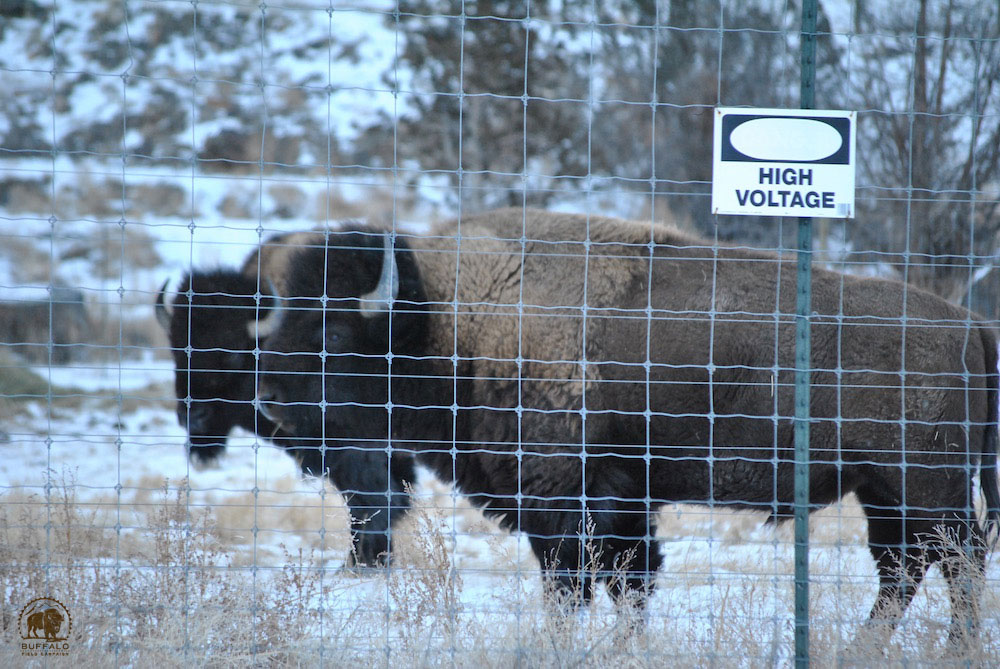Investigation requested into potentially unlawful destruction of public records and removal of scientific data in a government funded study.
Documents indicate federal agency employees deleted and discussed deleting emails and may have removed data in a population control study on bison from Yellowstone National Park.
Press Contacts
Darrell Geist, habitat coordinator, Buffalo Field Campaign (406) 531-9284
Daniel Snyder, attorney, Law Offices of Charles M. Tebbutt, P.C. (541) 344-3505
Justine Sanchez, President, Buffalo Field Campaign
Stephany Seay, media coordinator, Buffalo Field Campaign
West Yellowstone (MT) – Buffalo Field Campaign has requested the heads of two federal agencies open investigations into the potentially unlawful destruction of public records and removal of scientific data.
The letters released today were sent to Yellowstone National Park Superintendent Cameron (Cam) Sholly, and U.S. Dept. of Agriculture Animal and Plant Health Inspection Service Administrator Kevin Shea.
“Decades ago, Congress passed the Freedom of Information Act and the Federal Records Act to ensure public access to government records. This access is absolutely critical to the functioning of our democracy, for it allows public interest groups like Buffalo Field Campaign to keep a close, careful watch on those who govern,” said attorney Daniel Snyder, Law Offices of Charles M. Tebbutt, P.C. “There is no better panacea for corruption than a paper trail, which is why Federal agencies and employees have a duty to keep and retain public records.”
Records of federal agency employees discussing deleting emails and removing scientific data were divulged in a Freedom of Information Act lawsuit filed by Buffalo Field Campaign against the U.S. Dept. of Agriculture Animal and Plant Health Inspection Service. The lawsuit is ongoing and stems from a public records request the group made in October 2017. Buffalo Field Campaign is represented by the Law Offices of Charles M. Tebbutt, P.C.
In one record, Yellowstone National Park employee Rick Wallen wrote: “I have deleted the many emails with the whole group of folks in this conversation . . .”
Records also show U.S. Dept. of Agriculture Animal and Plant Health Inspection Service employees discussing withholding data from a study to evaluate sterilization by use of GonaCon on wild bison taken from Yellowstone National Park.
“No results are better than bad results!” wrote Jack C. Rhyan.
The sterilization study was the result of a “Starbucks brainstorm session” to push the idea of “decreasing prevalence” of brucellosis in bison.
In addition to discussing withholding scientific data and deleting emails, Animal and Plant Health Inspection Service employees made disrespectful comments about bison under their care.
Patrick R. Clarke: “Which brings up another question....some females were bred by SD bulls.....what do we do with their negative offspring? (i.e. the impure Yellowstone bastards!).”
Jack C. Rhyan: “I think with those we donate their little bastard carcasses to the food bank, as they have no special value for conservation.”
“PS: we might should delete these emails.”
“Contrary to the disrespect and ignorance shown by these employees, bison hold special value for restoring grasslands and regenerating a diversity of life on the prairies,” commented Justine Sanchez, President of Buffalo Field Campaign. “Bison have a spiritual nature that deserves our honor and respect.”
Animal and Plant Health Inspection Service Deputy Administrator Jack A. Shere ordered the study of GonaCon on bison be shut down and the bison slaughtered in 2017. Shere’s order came on the heels of an inspection of the Corwin Springs, Montana study facility that found employees had not reported their study to the Secretary of Agriculture. According to notes taken by a Montana Dept. of Livestock employee, “no one was aware that this research was occurring.”
The WiLDIT team behind the GonaCon study was disbanded.
The slaughter was carried out despite a provision in Yellowstone National Park’s permit which states: “Disease free bison should not be killed as a convenient method to move the animals out of USDA facilities.” The slaughter of bison in the GonaCon study was held up because all of the Montana slaughter plants were full with bison being captured for slaughter by Yellowstone National Park.
Yellowstone National Park permitted up to 171 bison to be taken from the wild for the study. Reports indicate 99 bison were taken from Yellowstone National Park and 3 bison from the Montana Dept. of Livestock. Bison were also bred as part of the study.
Bison given GonaCon are not fit for human consumption and were incinerated or landfilled. Several bison died from calf abandonment and goring, a sign of stress from confinement and breakdown in herd social structure, a result of slaughtering older family members.
Records also disclose bison died from being “hung in gate” and “hung in rope” and suffered other injuries resulting from confinement and handling. A handful of bulls remaining from the study are quarantined at a caged facility near Gardiner, Montana.
The records do not disclose what became of some bison that were transferred to Fort Collins as part of the GonaCon study and other research carried out in collaboration with Colorado State University.
“The government’s sterilization study on wild bison should never have been funded by the U.S. Congress, permitted by Yellowstone National Park, or carried out by a federal agency beholden to the livestock industry,” said Darrell Geist, habitat coordinator for Buffalo Field Campaign. “A lot of wild bison suffered and died because of a breakdown in government accountability.” Freedom of Information Act record excerpts
Rick Wallen, Yellowstone National Park: “Jack, I have deleted the many emails with the whole group of folks in this conversation so please pass along to Pauline and Matt.”
Rebecca K. Frey, Animal and Plant Health Inspection Service: “Sorry, I have just been working with the database a lot lately…….anyway, we started the GC project using Rivanol as one of the regular tests, however, the reagents have been off..(a known lab issue)… and we have been getting some bizarre results from Rivanol…. what do we plan to do with the Rivanol test results, and if we don’t have a complete set of tests over the years as with FP and CF and others….do we want to keep that data at hand or ignore it? I plan to “hide” that column for now….but I may delete in future……we still have all of the paper results filed away in my most secret
GC stash.”
Jack C. Rhyan, Animal and Plant Health Inspection Service: “I’d say keep it in your stash but let’s delete it. No results are better than bad results!”
Patrick R. Clarke, Animal and Plant Health Inspection Service: “Which brings up another question....some females were bred by SD bulls.....what do we do with their negative offspring?(i.e. the impure Yellowstone bastards!).”
Jack C Rhyan, Animal and Plant Health Inspection Service: “I think with those we donate their little bastard carcasses to the food bank, as they have no special value for conservation.”
“PS: we might should delete these emails.”

